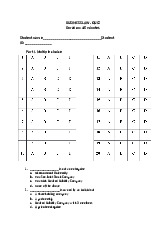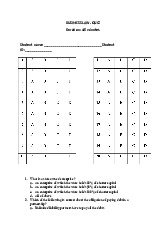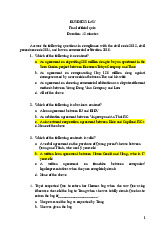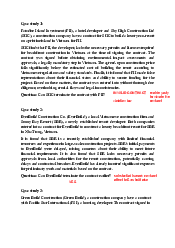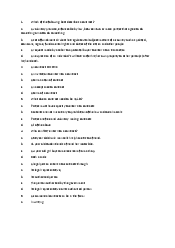










Preview text:
Vietnam National University – HCMC International University
SCHOOL OF BUSINESS ADMINISTRATION COURSE SYLLABUS1 BA081IU Business Law
Note: The outline with specific venue and time, and updated learning materials for the
current semester will be provided to the enrolled students by the lecturer 1. COURSE STAFF Lecturer: Mai The Kien Room: A1 304 Telephone: E-mail: mtkien@hcmiu.edu.vn
Consultation Hours: Wednesday Morning Teaching Assistant: Room: Telephone: E-mail: Consultation Hours:
Should the students wish to meet the staff outside the consultation hours, they are advised to make appointment in advance. 2. COURSE INFORMATION
2.1 Teaching times and Locations Lecturer(s): Venue: 2.2 Units of Credit
This course is worth 3 credits.
2.3 Parallel teaching in the course
There is no parallel teaching involved in this course.
2.4 Relationship of this course to others
You must take course of Introduction to Vietnamese Legal System in order to register for this
course. This is also strongly recommended to take up this course to succeed in severe other elective subjects, such as or Franchising
Legal Environment for Businesses.
2.5 Approach to learning and teaching
This is a foundation course so materials will be mainly presented in the form of g. lecturin
Besides, students will occasionally have opportunity to have presentation before class to
develop team-work and soft-skills. To improve research ability and personal work skill,
assignments are compulsory. Assignments will mainly based on materials not yet taught
during lesson and help students to develop problem-solving skill, especially legal cases.
Q&A session, regularly held at the end of each lesson’s part is not only a chance for students
to clarify the studying materials, but also learn how to answer in a most efficient way to get
as much as possible knowledge and academically discuss with lecturers/peers points of interests.
3. COURSE AIMS AND OUTCOMES 3.1 Course Aims
The aim of this course is to:
Familiarize the student with legal language; basic concepts, principles and general knowledge of business Law.
Introduce to students about main business forms in Vietnam and regulations for each.
Also, possibility of reorganization and Insolvency for enterprises, as main subject matter of this course.
Increase the student’s understanding of the Vietnamese regulations over business dispute resolution,
Expose the student to legal reasoning and develop his/her ability to apply legal concepts.
Introduce students to main trade international organizations and main international trade rules.
Develop problem solving and legal analyzing skills and apply it to day-to-day practical situations.
3.2 Student Learning Outcomes
After completing the course, students should have:
Basic knowledge on Legal regulations on business activities and enterprises. Main concepts and principles.
Knowledge on specific issues for operation, reorganization and insolvency of enterprises
Ability to analyze and choose the best way to solve business disputes and apply best
suitable regulations for enterprises.
Analyzing and problem-solving skills to be applied to practical cases
In generic terms, students completing this course are likely to achieve the following attributes:
Applied research. Conduct, write and present applied research relevant to this course.
Situational exploration. Critically appreciate situations, in terms of their factual,
political, temporal, and cultural dimensions.
Problem resolution. Structure and propose solutions to organizational problems that
enable management to guide multinational organizations through complex and ambiguous environments.
Argument and reasoning. Analyze, evaluate and construct arguments employing
different modes of reasoning and different types of evidence.
Disciplinary and multidisciplinary perspective. Bring disciplinary and multi-
disciplinary perspectives in straightening out situations and projecting possible outcomes.
Profound knowledge of legal language and its application.
3.3 Teaching Strategies
The learning system in this course consists of lectures and scheduled
presentations/discussions. Lectures elaborate the appropriate theoretical content in the
textbook and readings. Classes provide a more detailed and refined analysis of both concepts
and applied materials. Classes are strongly oriented towards interactive discussion of the text
and cases. In order to gain the most from the lectures and class activities, the below assigned
text/reading should be read before the lecture to participate in the discussions.
All students are required to take active part in the discussions and Q&A session at the end of lesson or relevant part.
Additional researches will be strongly encourage and might be generated additional points.
Besides, if students are facing a legal problem in practice they are welcome to bring it to the class and discuss.
4. STUDENT RESPONSIBILITIES AND CONDUCT 4.1 Workload
It is expected that the students will spend at least six hours per week studying this course.
This time should be made up of reading, research, working on exercises and problems, and
attending classes. In periods where they need to complete assignments or prepare for
examinations, the workload may be greater.
Over-commitment has been a cause of failure for many students. They should take the
required workload into account when planning how to balance study with part-time jobs and other activities. 4.2 Attendance
Regular and punctual attendance at lectures and seminars is expected in this course.
University regulations indicate that if students attend less than eighty per cent of scheduled
classes they may be refused final assessment. Exemptions may only be made on eligible medical grounds.
4.3 General Conduct and Behavior
The students are expected to conduct themselves with consideration and respect for the needs
of the fellow students and teaching staff. Conduct which unduly disrupts or interferes with a
class, such as ringing or talking on mobile phones, is not acceptable and students will be
asked to leave the class. Use of laptops is also prohibited during law lessons. More
information on student conduct is available at the university webpage. 4.4 Keeping informed
The students should take note of all announcements made in lectures or on the course’s
Blackboard, and other announced mean of communications. From time to time, the
university will send important announcements to their university e-mail addresses without
providing a paper copy. The students will be deemed to have received this information. 5. LEARNING ASSESSMENT
5.1 Formal Requirements
In order to pass this course, the students must:
achieve a composite mark of at least 50; and
make a satisfactory attempt at all assessment tasks (see below). 5.2 Assessment Details
Mid-Term Exam (approximately 60 mins) 30%
Assignment, Participation Presentation 20% Final Exam (up to 120mins) 50% Total 100%
5.3 Marking criteria (project report and case presentation) Marking Criteria Marks
Learning outcomes/attributes Quality of arguments: 20
Ability to give compelling arguments and relevance, logic and cohesion reasoning to support analysis Use of frameworks to 20
Ability to structure problems in accordance support analysis
with theoretical frameworks and resolve them Use of case evidence to 20
Ability to conduct applied research to gather support analysis
data/information pertaining to the case Originality and usefulness of 20
Ability to engage in creative problem the analysis solving skills Organisation, clarity of 20 Clarity of vision expression, editing etc
5.4 Class participation and Presentation
A minimum attendance of 80 percent is compulsory. Students will be assessed on the basis of: a) Presentation of case 15%
b) Class attendance and participation 5%
5.5 Special Consideration
Request for special consideration (for final examination only) must be made to the Office of
Academic Affairs within one week after the examination. General policy and information on
special consideration can be found at the Office of Academic Affairs. Absence on the Mid-
term is not allowed, or in special cases approved by Lecturer can be replaced with relevant Assignment.
6. ACADEMIC HONESTY AND PLAGIARISM
Plagiarism is the presentation of the thoughts or work of another as one’s own (definition
proposed by the University of Newcastle). Students are also reminded that careful time
management is an important part of study and one of the identified causes of plagiarism is
poor time management. Students should allow sufficient time for research, drafting, and the
proper referencing of sources in preparing all assessment items. The university regards
plagiarism as a form of academic misconduct, and has very strict rules regarding plagiarism.2 7. STUDENT RESOURCES 7.1 Course Resources
Please note that it is very important to gain familiarity with the subject matter in the readings and cases attendance in classes. prior to Legal Texts:
1. Civil Code of Vietnam - 2020 2. Commercial Law – 2020 3. Law on Investment – 2020
4. Law on Enterprises – 2020 5. Law on Bankruptcy – 2020
6. Civil procedure code – 2020
7. Law on commercial arbitration – 2010 Reference Books: -
Đại học luật Hà Nội, Giáo trình Luật Thương mại 1, (10th edn, Công An Nhân Dân 2014). -
Đại học luật Hà Nội, Giáo trình Luật Thương mại 2, (9th edn, Công An Nhân Dân 2015)
Additional materials provided in Blackboard
The lecturer will attempt to make lecture notes and additional reading available on
Blackboard. However this is not an automatic entitlement for students doing this subject.
Note that this is not a distance learning course, and you are expected to attend lectures and
take notes. This way, you will get the additional benefit of class interaction and demonstration.
2 This is adapted with kind permission from the University of New South Wales. Recommended Internet sites
UNCTAD (United Nations Conference on Trade and Development)
WTO (World Trade Organization)
MOIT - Vietnam (Official website of Ministry of Industry and Trade)
MPI - Vietnam (Official website of Ministry of Planning and Investment)
7.2 Other Resources, Support and Information
Additional learning assistance is available for students in this course and will be made
available in Blackboard. Academic journal articles are available through connections
via the VNU - Central Library. Recommended articles will be duly informed to the students. 8. COURSE SCHEDULE Week Topic Learning materials and activities 1
Business Law and Business Entity Lecture
Introduction of the course and explanation of
syllabus and other academic matters Allocation of Discussion Introduction to Business law Questions - What is Business Law? - Its subject matters In-class group discussion - Its main subject Source: Law on - Its sources Enterprises 2014 - Its roles -
Comparative study of severe business law systems
Introduction to Business Entities
Overview and nature of business entities in Vietnam 2
Business Entity: Business Household, Private Students are to prepare
Enterprise and Partnership. presentations on topics as Characteristics defined by lecturer Management structure Strength and weakness Source: Law on Comparison with other entities Enterprises 2014 3
Business Entity: Limited Liability Companies Students are to prepare
(Sign member and two or more members) presentations on topics as Characteristics defined by lecturer Management structure Strength and weakness Source: Law on Comparison with other entities Enterprises 2014 4
Business Entity: Shareholding Company and Students are to prepare State owned enterprise presentations on topics as Characteristics defined by lecturer Management structure Strength and weakness Source: Law on Comparison with other entities Enterprises 2014 5
Business Registration and Re-organization: Students are to prepare Business Registration: presentations on topics as Formalities defined by lecturer Procedure Discussion on severe Business Reorganization: cases of practice. Consolidation Merger Source: Law on Separation Enterprises 2014 Division Dissolution 6 Law on bankruptcy Lecturer can also form a Insolvency group doing specific Bankruptcy procedure Bankruptcy topic
Legal consequences of bankruptcy Students are to prepare presentations on topics as defined by lecturer Source: Law on bankruptcy 2014 7 Law on Investment Students are to prepare General introduction: presentations on topics as Business investment activities defined by lecturer Business investment areas
Policies on investment (investment guarantee, support and incentives) Source: Law on Business investment procedures Investment 2014 8
Business dispute resolutions: Lecture
Introduction on dispute resolution methods.
Definition and nature of each dispute Source: Civil Procedure resolution methods Code 2015.
Advantages and disadvantages of each dispute resolution methods
Dispute resolution under court systems Discussion on cases of
according to Vietnamese Civil Procedure substance. - Court’s jurisdiction -
Principles of dispute settlements - Dispute settlement procedure - 1st instance Trial - Appellate Trial - Cassation Trail - Re-opening trial 9
Business Dispute Resolutions: Lecture
Dispute resolution under Arbitration according to Vietnamese law Source: Law on -
General introduction about Vietnamese commercial arbitration
regulation of arbitration and Ordinance 2010. on Arbitration 2010 Arbitration’s jurisdiction Dispute settlement procedure Discussion on cases of substance. 10 + 11
Contractual Law: general regulations Lecture General Introduction: - Definition - Subject matters Legal Text: Civil Code 2005 - Principles Validity of contracts Contract formation Discussion on cases of - Offer and Acceptance substance. - Forms of contract - Time and place - Contents of contract Effectiveness of contracts 12
Contractual Law: General regulations Lecture Contract performance - Principles -
Contract performance in specific cases Legal Text: Civil Code 2005 Breaches and Remedies Contractual termination Discussion on cases of substance. 13 International trade law
International Trade Law, Introduction Indira Carr, 5th 2014
Introduction to Business Trade Law
Sources of International trade law
Introduction to main International Trade Lecture Organizations: WTO
Introduction to regional trade organizations: EU, ASEAN, MERCOSUR… 14
International Business Law
International Trade Law, Introduction Indira Carr, 5th 2014 International sale of goods - Incoterm 2010 - The Vienna convention on the Lecture
international sale of goods 1980
International transport of cargo International payment: UCP 600 15
Revision/ Tutoring classes As per necessity of each lecturer.
1 The syllabus is prepared following the format provided by the School of Organisation and Management, University of
New South Wales, with kind permission.
